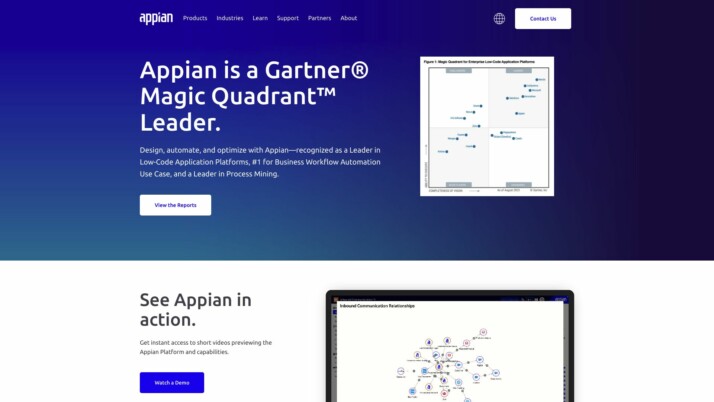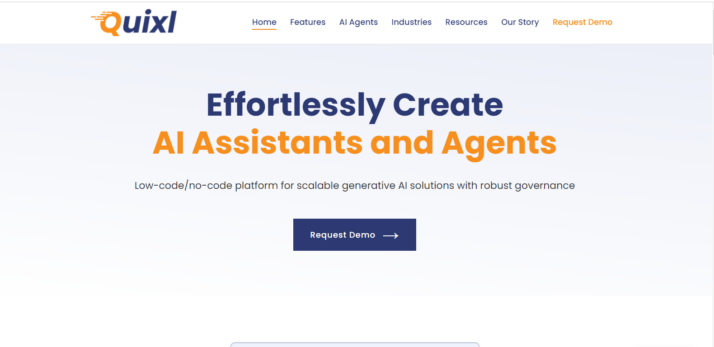Appian vs. Quixl AI: Comparing AI Integration Platforms
AI integration platforms transform business operations, but choosing the right solution can be daunting. This comparison of Appian vs. Quixl AI, and SmythOS reveals key differences in AI capabilities, ease of use, and scalability. We examine how each platform empowers businesses to harness AI’s potential, from low-code development to advanced model integration. Whether you’re a developer seeking powerful APIs, a business leader focused on enterprise-wide adoption, or a non-technical user looking for accessible AI tools, this analysis helps you navigate the strengths and limitations of these cutting-edge platforms. Discover which solution best aligns with your organization’s AI ambitions and technical requirements.
Appian Overview
Appian empowers businesses to harness artificial intelligence through its low-code platform. The software integrates AI capabilities into existing workflows, allowing organizations to automate processes and enhance decision-making without extensive coding expertise.
Appian’s AI toolkit includes pre-built models for document classification, data extraction, and email routing. These solutions tackle common business challenges, freeing up human workers to focus on higher-value tasks. The platform also supports custom AI development, enabling teams to create tailored models for specific use cases.
Appian empowers businesses to harness artificial intelligence through its low-code platform… allowing organizations to automate processes and enhance decision-making without extensive coding expertise.


Security and transparency are core tenets of Appian’s AI approach. The platform emphasizes data privacy, keeping AI models and training data within the organization’s control. Appian provides detailed explanations and confidence scores for AI-generated outputs, promoting trust and auditability.
Security and transparency are core tenets of Appian’s AI approach. The platform emphasizes data privacy, keeping AI models and training data within the organization’s control.
While Appian offers robust AI integration, it lacks some advanced features found in dedicated AI agent platforms. The software doesn’t explicitly support autonomous agent collaboration or provide a debug mode for AI models. Additionally, Appian’s AI capabilities primarily focus on enhancing existing business processes rather than creating standalone AI agents for open-ended tasks.
Appian positions itself as a comprehensive solution for enterprise AI adoption. The platform seamlessly connects AI models with databases, APIs, and robotic process automation tools. This integration allows businesses to deploy AI-powered solutions across their entire organization, from customer service to back-office operations.
Quixl AI Overview
Quixl AI, developed by Integra, offers a comprehensive platform for AI adoption across industries. The platform features a no-code AI agent builder that leverages generative AI and large language models to streamline automation and boost productivity. Quixl’s AI Agents Hub provides pre-built agents for quick deployment, while its Prompt Studio enables advanced prompt-engineering and customization.


Quixl AI, developed by Integra, offers a comprehensive platform for AI adoption across industries … leverages generative AI and large language models to streamline automation and boost productivity.
Quixl AI excels in supporting seamless AI integration, rapid deployment, and scalable growth. Its applications span from alt-text generation and manuscript assessment to enterprise knowledge search and content editing. The platform caters to specific industries like Media and Entertainment, Publishing and EdTech, and Healthcare by enhancing user engagement, personalizing learning experiences, and automating administrative tasks.
Integra, with its three decades of technological excellence, has designed Quixl to be a unified, scalable, and secure AI ecosystem. The platform facilitates AI monetization through a robust API Gateway and ensures data security with advanced transfer mechanisms. Quixl supports both on-premises and cloud deployments, making it adaptable for businesses of all sizes.
While Quixl AI offers impressive capabilities, it faces competition in a rapidly evolving market. The platform’s effectiveness in handling complex, multi-step tasks or supporting multi-agent collaborations remains unclear. Additionally, as with many AI platforms, users may need to carefully consider data privacy and security implications when integrating Quixl into their existing systems.
Quixl AI’s integration capabilities extend to various APIs and support robotic process automation (RPA), enhancing its versatility. However, the platform’s documentation doesn’t explicitly mention support for popular AI model repositories like Hugging Face or integration with workflow automation tools like Zapier, which could limit some advanced use cases.
Feature Comparison
Appian and Quixl AI offer distinct approaches to AI integration and automation, with some key differences in their core components and security features. Appian excels in low-code AI integration, providing a visual builder and no-code options for creating AI models within existing business processes. Its strength lies in enhancing automation through AI capabilities like document classification and data extraction. Quixl AI, on the other hand, focuses on generative AI and large language models, offering a no-code AI agent builder and pre-built agents for quick deployment.
In terms of core components, Appian lacks explicit support for autonomous agent collaboration and debug mode for AI models. Quixl AI’s documentation doesn’t mention these features either, suggesting a potential gap for both platforms in complex, multi-step tasks or multi-agent collaborations. Regarding security, Appian emphasizes data privacy and provides detailed explanations for AI-generated outputs, promoting trust and auditability. Quixl AI ensures data security with advanced transfer mechanisms but doesn’t specifically mention features like constrained alignment or IP control.
Both platforms support API integrations and robotic process automation, enhancing their versatility. However, neither explicitly mentions integration with popular AI model repositories like Hugging Face or workflow automation tools like Zapier, which could limit some advanced use cases. This comparison highlights the need for users to carefully consider their specific requirements when choosing between Appian and Quixl AI, as each platform offers unique strengths in AI integration and automation capabilities.
Feature Comparison Table
| Appian | Quixl AI | SmythOS | |
|---|---|---|---|
| CORE FEATURES | |||
| Hosted Agents (Dev, Production) | ❌ | ✅ | ✅ |
| Autonomous Agents | ❌ | ✅ | ✅ |
| Multi-Agent Collaboration | ❌ | ✅ | ✅ |
| Agent Work Scheduler | ❌ | ✅ | ✅ |
| SECURITY | |||
| COMPONENTS | |||
| Foundation AIs | ❌ | ✅ | ✅ |
| Huggingface AIs | ❌ | ✅ | ✅ |
| Zapier APIs | ❌ | ✅ | ✅ |
| DEPLOYMENT OPTIONS (EMBODIMENTS) | |||
| Deploy as Site Chat | ❌ | ✅ | ✅ |
| Deploy as Scheduled Agent | ❌ | ✅ | ✅ |
| Deploy as GPT | ❌ | ✅ | ✅ |
| DATA LAKE SUPPORT | |||
| Hosted Vector Database | ❌ | ✅ | ✅ |
| Sitemap Crawler | ❌ | ❌ | ✅ |
| YouTube Transcript Crawler | ❌ | ❌ | ✅ |
| URL Crawler | ❌ | ❌ | ✅ |
Best Alternative to Appian and Quixl AI
SmythOS emerges as the superior alternative to Appian and Quixl AI, offering a comprehensive platform for AI agent creation and deployment. We provide a user-friendly yet powerful solution that outshines competitors in ease of use, feature set, and versatility.
Our drag-and-drop interface simplifies AI development, allowing users to create sophisticated agents without extensive coding knowledge. This visual approach, combined with our extensive library of pre-built components, accelerates development and empowers users to rapidly prototype and deploy AI solutions.
SmythOS emerges as the superior alternative to Appian and Quixl AI, offering a comprehensive platform for AI agent creation and deployment. We provide a user-friendly yet powerful solution that outshines competitors…
SmythOS excels in its extensive integration capabilities. While Appian and Quixl AI offer limited options, our platform supports a wide array of AI models, APIs, and third-party services. This flexibility enables users to leverage cutting-edge AI technologies and seamlessly incorporate them into existing workflows.
Unlike our competitors, SmythOS offers true multi-agent collaboration and autonomous agent capabilities. Our platform allows for the creation of complex, interlinked AI systems that can work together to solve intricate problems. This feature sets us apart in handling sophisticated, multi-step tasks that require coordinated AI efforts.
SmythOS also distinguishes itself with robust security features and deployment options. We provide granular control over data privacy, encryption, and access management, addressing the stringent security requirements of enterprise clients. Our platform supports various deployment scenarios, from chatbots and scheduled agents to full API integrations, offering unparalleled flexibility in how AI solutions are implemented and utilized.
Conclusion
Appian and Quixl AI offer compelling AI integration solutions, each with unique strengths. Appian excels in low-code AI integration within existing business processes, while Quixl AI focuses on generative AI and large language models. Both platforms provide valuable tools for businesses seeking to leverage AI, but they may fall short in advanced features like autonomous agent collaboration or debug modes for AI models.
While Appian and Quixl AI have their merits, SmythOS emerges as the superior choice for businesses seeking comprehensive AI integration and automation. SmythOS combines the best of both worlds, offering a user-friendly drag-and-drop interface for building complex AI workflows without extensive coding knowledge, similar to Appian’s low-code approach. At the same time, it supports a wide range of AI models and generative AI capabilities, rivaling Quixl AI’s offerings.
SmythOS stands out with its extensive integration ecosystem, supporting over 300,000 integrations and compatibility with various AI models from providers like OpenAI, Anthropic, and Hugging Face. This versatility ensures that SmythOS can adapt to virtually any workflow or business process. Moreover, SmythOS’s multi-agent orchestration capabilities and versatile deployment options across platforms like Google Vertex, Microsoft Copilot, and Amazon Web Services Bedrock set it apart from both Appian and Quixl AI.
For businesses looking to harness the full potential of AI and transform their workflows, SmythOS offers unparalleled flexibility and power. Its vision to make AI creation and deployment 99% faster aligns perfectly with the needs of modern enterprises seeking to innovate and automate at scale. We invite you to explore SmythOS’s extensive documentation and diverse range of AI-powered agent templates to see how it can revolutionize your approach to AI integration and automation. Take the first step towards AI-powered success by creating a free SmythOS account and experience the future of AI workforce automation today.
Last updated:
Disclaimer: The information presented in this article is for general informational purposes only and is provided as is. While we strive to keep the content up-to-date and accurate, we make no representations or warranties of any kind, express or implied, about the completeness, accuracy, reliability, suitability, or availability of the information contained in this article.
Any reliance you place on such information is strictly at your own risk. We reserve the right to make additions, deletions, or modifications to the contents of this article at any time without prior notice.
In no event will we be liable for any loss or damage including without limitation, indirect or consequential loss or damage, or any loss or damage whatsoever arising from loss of data, profits, or any other loss not specified herein arising out of, or in connection with, the use of this article.
Despite our best efforts, this article may contain oversights, errors, or omissions. If you notice any inaccuracies or have concerns about the content, please report them through our content feedback form. Your input helps us maintain the quality and reliability of our information.
